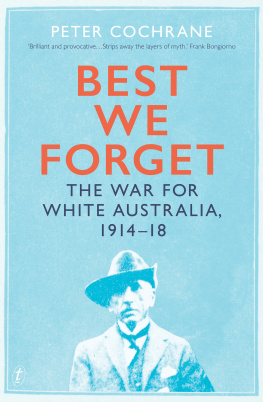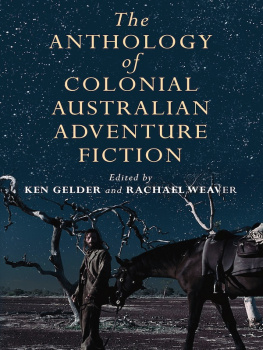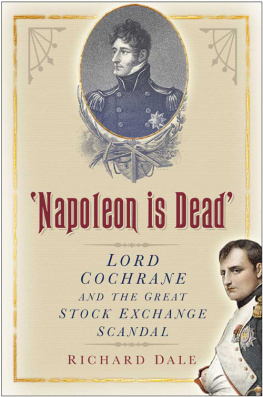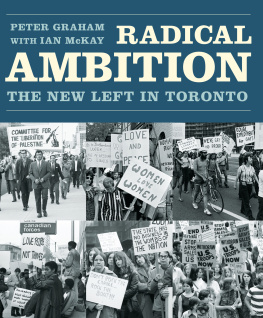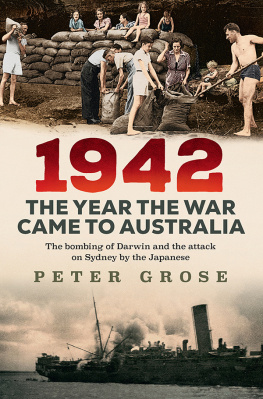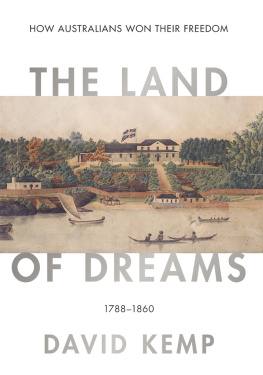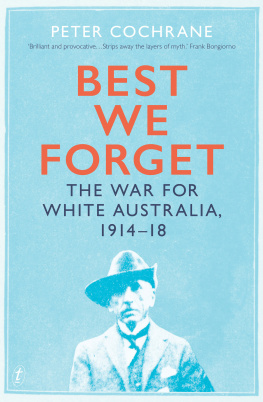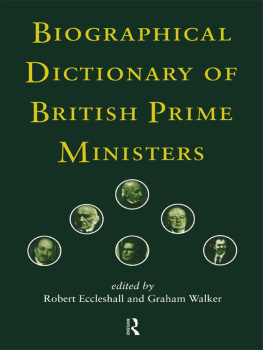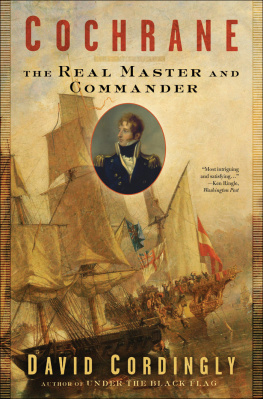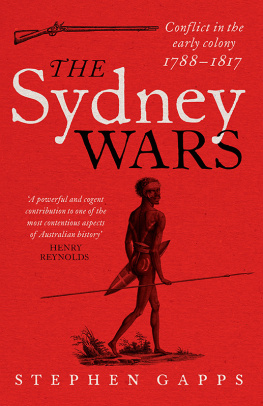Praise for Peter Cochranes Colonial Ambition
Peter Cochrane breathes life into one of Australias greatest but least understood stories: the birth of the worlds unlikeliest democracy. He tells the story with a robustness worthy of Carlyle, through a cast of characters worthy of Dickens. It is a uniquely Australian story of how a divided and unruly community, based on convictism, autocracy and a rapacious oligarchy transformed itself into the world's most stable and progressive democracy of its time, the first two decades of Queen Victorias reign. Hardly any of the main actors, either in Sydney or London, wanted democracy.The architect of colonial self-government, William Charles Wentworth, abhorred the idea of a Yankee Constitution. Yet within three years of home rule in 1856, New South Wales, Victoria, South Australia and Tasmania possessed the fundamentals of parliamentary democracy, at least thirty years ahead of Britain itself. Peter Cochrane lets his characters speak for themselves, with all the rich muscularity of language in which the Victorians revelled, in sharp contrast to the glossy mediocrity of todays political discourse. They still have a message for us about the futility of attempts to force or impose democracy Peter Cochrane has written the definitive account of Australias most difficult and most enduring political achievement.
Graham Freudenberg
This is not the usual political history; its more wide-ranging, more vivid, more alive with people, places and talk.
John Hirst
Peter Cochrane gives life to Australian political history in a way that has rarely been done before. Colonial Ambition is the kind of history that Manning Clark wanted to write but rarely achieved.
Tim Bonyhady
LIST OF PLATES
Facing pages 272 and 273:
1. Emigrants Disembarking in Sydney Cove
2. Section 2 of Blackwoods Panorama
3. Section 3 of Blackwoods Panorama
4. Upper Hunter Street
5. Lower Hunter Street
6. Ciar inda Parkes
7. Henry Parkes
8. William Charles Wentworth
9. Sarah Wentworth in the 1860s
10. Sir George Gipps
11. James Macarthur
12. Robert Lowe
13. Sir Charles Fitzroy
14. John Bayley Darvall
Facing pages 296 and 297:
15. John Dunmore Lang
16. Congregational Church Deacons of Pitt Street, including John Fairfax
17. Henry Grey, the Third Earl Grey, Secretary of State for War and the Colonies, 18461852
18. Lord John Russell
19. Glass stereograph of Government House by Edwin Dalton, 1859
20. Glass stereograph of Circular Quay, by Edwin Dalton, 1859
21. Glass stereograph of Campbells Wharf, by Edwin Dalton, 1859
22. Studio portrait of Sir William Denison by Freeman Bros.
23. The First Ministry under Responsible Government, 1856
24. Charles Cowper
25. Cricket match in the Domain
26. John Bowie Wilson
27. William Richman Piddington
28. Portrait of Daniel Deniehy with top hat
29. Portrait in oils of three of the Wentworths daughters
30. Vaucluse, 1851, a view north across the harbour
ACKNOWLEDGEMENTS
For helpful advice and for comments on draft chapters or parts thereof I wish to thank Rodney Cavalier, David Clune, Barrie Dyster, Shirley Fitzgerald, Stephen Foster, Hilary Golder, Gareth Griffith, Ian Hancock, Michael Hogan, Carol Liston, Greg Lockhart, Alan Powell and Jim Struthers. I am especially grateful to those who read the entire manuscript in the concluding phases of the project and provided me with commentary that was either detailed or panoramic or boththanks to Tim Bonyhady, Graham Freudenberg, John Hirst, Stuart Macintyre, Suzanne Rickard and Ken Turner.
Much of the research for this book was carried out at the Mitchell Library. I would like to thank all the Mitchell staff for their assistance, particularly those who gave me expert advice and direction on many occasions: Helen Benaceck, Ronald Briggs, Andy Carr, Elizabeth Ellis (Mitchell Librarian), Gail Guyatt, Mark Hildebrand (Dixson Librarian), Melissa Jackson, Kevin Leamon, Suzanne Mallon, Judy Nelson, David Pollock, Jo Searle and Linda West. The assistance of staff in Original Materials was also essential. Thanks to Jennifer Broomhead, Alan Davies, Cheryl Evans, Arthur Easton, Warwick Hirst, Richard Neville, Chris Pryke, Margot Riley and Josef Trunecke.
Some of the preliminary research was undertaken while I was a C. H. Currey Fellow at the Mitchell Library in 1997. I wish to acknowledge the support of the library in this regard. Due to the exigencies of freelance writing, the fellowship research sat on the shelf for some years, but it was valuable grounding when this book got underway. Earlier research on British identity in the colonies, undertaken with the assistance of an Australian Research Council grant, also fed into this project, and I wish to acknowledge ARC support.
At Historic Houses Trust, thanks to Megan Martin, Michael Lech and Scot Hill for assistance relating to Wentworth family images and the transcribed copies of Wentworth family correspondence.
In first semester 2005 I was a visiting scholar at La Trobe University. Thanks to Richard Broome who facilitated my stay in the History Department, and to John Hirst who, as ever, kept me questioning the work-in-progress. I would also like to acknowledge the support of the University of Sydney where I have been one of those Honorary Associates who spends far more time among the riches of the Fisher Library than anywhere else on campus. In this regard I am particularly grateful to Richard Waterhouse and Richard White.
Freelance writers need good agents and I have been fortunate to have the expertise, guidance and friendship of Mary Cunnane. My thanks to Mary, and to Cressida Hall, at cunnaneagency.com.
The production side of the book has been a happy journey. For that, the accolades must go to my editor at MUP, Foong Ling Kong, and to my copy editor, Sally Moss. I am most grateful for their professional skills, enthusiasm and commitment to the book.
I want to acknowledge the support of the Sesquicentenary Committee members who were responsible for proposing this book initially and who subsequently have been ready to assist whenever required. I am particularly grateful to the chairman of the committee, Rodney Cavalier. Rodneys enthusiasm, critical input and general advice have been available whenever needed. Others on or near the committee, David Clune in particular, have been helpful all along the way, while Barbara Fahey has assisted this project on countless occasions. So too has Greig Tillotson at the New South Wales Parliamentary Library and Robert Laurie at the Parliamentary Archives.
My colleagues at the National Centre for History Education provided a ceaseless flow of good conversation on history matters that I am sure fed into the manuscript in lateral ways. Our business at the NCHE is the promotion of history teaching and learning in secondary schools throughout Australia, so its natural for us to share mutually and supportively in each others projects. Thanks to Brian Hoepper, Scilla Rantzen and Tony Taylor.
Thanks are due to many others for that meld of interest and input and sustaining conversationto Linda Brainwood, Jill Brown, Margy Burn, Robert Darby, Phillip Deery, Janet Jeffs, Adrian Jones, David Lewis, Corinne Manning, Stephen Martin, Andrew Moore, Ken Olah, Tim Peach, David Rickard, Gillian Shadwick, Julie Wark and Barry York.


